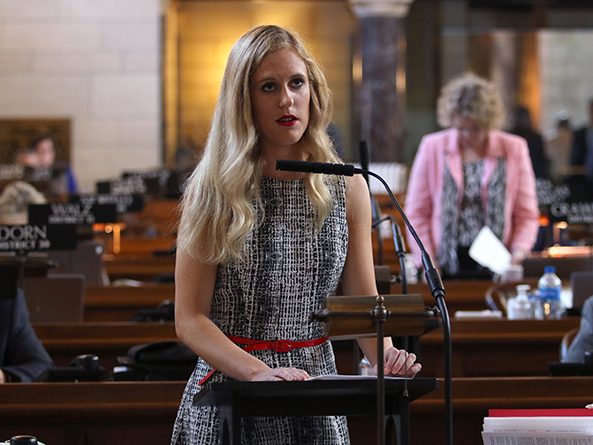Human trafficking statute of limitation bill expanded, advanced
A bill that would extend and eliminate certain statutes of limitation for labor and sex trafficking was amended and advanced from general file May 16.

LB519, introduced by Peru Sen. Julie Slama, would eliminate a statute of limitation for creation of child pornography or labor or sex trafficking of a minor.
A fear or distrust of law enforcement prevents many survivors from seeking help, Slama said, and by the time they do report the crime, the statute of limitation has elapsed and charges cannot be filed.
“The victims of human trafficking need to feel like they can come forward and report the crimes against them,” she said, “but many victims feel shame and embarrassment that they were trafficked, and they fear retaliation of violence against them or their families by their traffickers if they report the crime.”
The bill would increase the statute of limitations from three years to seven for labor or sex trafficking of an adult. It also would extend the statute of limitations for possession of child pornography to seven years, or seven years beyond a victim’s 18th birthday.
Finally, LB519 would allow law enforcement to apply for wiretap authorization to intercept electronic communications relating to labor or sex trafficking of adults and minors.
A Judiciary Committee amendment incorporated three additional bills.
Provisions of LB517, originally introduced by Lincoln Sen. Patty Pansing Brooks, would allow a trafficking victim to recover damages for physical and mental pain and suffering, and the reasonable value of medical care and supplies, transportation, housing, child care, lost wages and potential relocation costs.
The amendment also included portions of LB516, also introduced by Pansing Brooks, which would require the state Department of Health and Human Services to collect and report information on children who are reported or suspected trafficking victims, the number of reports alleging trafficking of a minor, the services and costs provided to minor victims, the number of ongoing cases opened due to alleged trafficking and the number of substantiated victims and their demographic information.
The committee amendment also would expand the definition of child abuse to include placing a child in a situation to be sexually abused or exploited, a provision originally included in Omaha Sen. Steve Lathrop’s LB458.
It also would expand the definition of out-of-home child abuse to include cases where the perpetrator of such abuse is not a member of the victim’s household, no longer has access to the victim or is unknown or cannot be identified.
Brainard Sen. Bruce Bostelman spoke in support of the bill. Human trafficking is a serious problem, he said, and all Nebraskans should be vigilant.
“In my district, there have been arrests for human trafficking of a child,” Bostelman said. “If you don’t think human trafficking exists in the state or happens in your community, you’re wrong.”
Lincoln Sen. Anna Wishart introduced an amendment, adopted 37-0, which added portions of her LB479 into the bill. As amended, these would prohibit a law enforcement officer from using consent as a defense for sexual contact with a person who is detained or in custody. Further, it would codify that any person detained by law enforcement is not able to consent to sexual contact.
Current state law establishes that an inmate or parolee cannot consent to sexual contact with a correctional officer and imposes increased criminal penalties for sexual contact, Wishart said, but these same prohibitions do not apply to law enforcement.
“As of 2018, 35 states including Nebraska have a loophole in their statutes that don’t specifically prohibit a law enforcement officer from having sexual contact with someone they are detaining,” she said. “This would extend protection to all Nebraskans who are detained by law enforcement.”
The amendment would classify sexual penetration of a detainee as first-degree sexual abuse, which is a Class IIA felony. Conviction could result in up to 20 years imprisonment.
Sexual contact with a detainee would be classified as second-degree sexual abuse, which is a Class IIIA felony. It would carry a penalty of up to three years in prison with 18 months of post-release supervision, a $10,000 fine or both.
Anyone convicted under the amended provisions would be required to register as a sex offender.
Following the 40-0 adoption of the committee amendment and a technical amendment, senators advanced LB519 to select file on a 45-0 vote.


